Postconviction Relief
Ineffective Assistance of Counsel
Newly Discovered Evidence
Were you or someone you know wrongly convicted of a crime?
Contact a criminal postconviction attorney in Minnesota today at 612-910-2104, or by clicking here.
Postconviction work is often life-saving work, and if you’ve been wrongly convicted for a crime, the only way to reverse that conviction may be to effectively petition for postconviction relief.
Under Minn. Stat. § 590, a person convicted of a crime in Minnesota may petition the district court for postconviction relief if they believe that:
the conviction obtained or the sentence or other disposition made violated the person's rights under the Constitution or laws of the United States or of the state; or
scientific evidence not available at trial, obtained pursuant to a granted motion, establishes the petitioner's actual innocence.
If a petition for postconviction relief is successful, the court may vacate and set aside the judgment and discharge the petitioner, resentence the petitioner, grant a new trial, or correct the sentence or make other disposition as may be appropriate.
Was your attorney ineffective? Did a judge disregard the law in making a ruling in your case? Has a witness who testified changed their story? Did a victim recant?
Postconviction relief can address all of these issues. Ineffective assistance of counsel—or having a bad attorney—is a legal challenge that may be raised after a conviction was entered to reopen the criminal proceedings and, in some situations, reverse them entirely. Likewise, mistakes made by a court may be addressed through postconviction proceedings before taking those issues up with the Minnesota Court of Appeals.
Timelines for Seeking Postconviction Relief
Postconviction relief generally is subject to strict timelines, but there are some situations in which postconviction relief may be available for an individual years or decades into the future.
Minn. Stat. § 590.01, subd. 4 outlines the specific time limits associated with seeking postconviction relief. Generally speaking, no petition for postconviction relief may be filed more than two years after the later of: (1) the entry of judgment of conviction or sentence if no direct appeal is filed; or (2) an appellate court's disposition of petitioner's direct appeal.
However, a court may hear a petition for postconviction relief outside of that two-year window if:
the petitioner establishes that a physical disability or mental disease precluded a timely assertion of the claim;
the petitioner alleges the existence of newly discovered evidence, including scientific evidence, that could not have been ascertained by the exercise of due diligence by the petitioner or petitioner's attorney within the two-year time period for filing a postconviction petition, and the evidence is not cumulative to evidence presented at trial, is not for impeachment purposes, and establishes by a clear and convincing standard that the petitioner is innocent of the offense or offenses for which the petitioner was convicted;
the petitioner asserts a new interpretation of federal or state constitutional or statutory law by either the United States Supreme Court or a Minnesota appellate court and the petitioner establishes that this interpretation is retroactively applicable to the petitioner's case;
the petitioner was convicted and sentenced for a crime committed before May 1, 1980, and claiming that a significant change in substantive or procedural law has occurred which, in the interest of justice, should be applied retrospectively, including resentencing under subsequently enacted law; or
the petitioner establishes to the satisfaction of the court that the petition is not frivolous and is in the interests of justice.
Generally speaking, any petition must be filed within two years of the date the claim arises.
You need an expert Minnesota criminal postconviction lawyer.
Postconviction relief is primarily about correcting mistakes, setting the record straight, and setting yourself up for a successful appeal.

